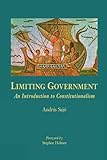Limiting Government : An Introduction to Constitutionalism / ed. by András Sajó.
Material type: TextPublisher: Budapest ; New York : Central European University Press, [1999]Copyright date: 1999Description: 1 online resource (308 p.)Content type:
TextPublisher: Budapest ; New York : Central European University Press, [1999]Copyright date: 1999Description: 1 online resource (308 p.)Content type: - 9789633863879
- 342.0201 21/eng/20230216
- online - DeGruyter
| Item type | Current library | Call number | URL | Status | Notes | Barcode | |
|---|---|---|---|---|---|---|---|
 eBook
eBook
|
Biblioteca "Angelicum" Pont. Univ. S.Tommaso d'Aquino Nuvola online | online - DeGruyter (Browse shelf(Opens below)) | Online access | Not for loan (Accesso limitato) | Accesso per gli utenti autorizzati / Access for authorized users | (dgr)9789633863879 |
Browsing Biblioteca "Angelicum" Pont. Univ. S.Tommaso d'Aquino shelves, Shelving location: Nuvola online Close shelf browser (Hides shelf browser)

|

|

|

|

|

|

|
||
| online - DeGruyter Reassessing Communism : Concepts, Culture, and Society in Poland 1944–1989 / | online - DeGruyter Russia on the Danube : Empire, Elites, and Reform in Moldavia and Wallachia, 1812–1834 / | online - DeGruyter The 1956 Hungarian Revolution : A History in Documents / | online - DeGruyter Limiting Government : An Introduction to Constitutionalism / | online - DeGruyter A Bibliography of East European Travel Writing on Europe / | online - DeGruyter Russian Foreign Policy in Transition : Concepts and Realities / | online - DeGruyter The Challenges of Sustained Development : The Role of Socio-cultural Factors in East-central Europe / |
Frontmatter -- TABLE OF CONTENTS -- Foreword -- Introduction -- Chapter 1. The Constitution as Fear and Acceptance -- 1.1. Fear's Creatures -- 1.2.Types of Fear -- 1. 3. Ulysses Binds Himself to the Mast -- 1.4. Definitional Dangers -- 1.5. Constituent Power -- 1.6. What Precedes a Constitution? Order and Acceptance -- 1.7. The Content of a Constitution: Neutrality or Common Objectives? -- 1.8. The Legal Nature of a Constitution -- Chapter 2. The Taming of Democracy -- 2 .1. Diluted People's Sovereignty and Weak Democracy -- 2.2. Majority Rule -- 2.3. The Constitutional Limits to Democracy -- 2.4. Referendum and Destabilization -- Chapter 3. Dangerous Liaisons: Checks and Balances and the Separation of Powers -- 3 .1. The Balancing Act -- 3.2. Separation and Dependence in Creation and Termination -- 3.3. Separate Operations and Joint Decisions -- 3.4. Additional Counterbalancing Factors -- 3.5. When Does the Counterweight Become Excessive Weight? -- 3.6. Separation and Freedom -- Chapter 4. Parliamentarism and the Legislative Branch -- 4.1. The Transformations of Parliament -- 4.2. The Structure and Operation of Parliament -- 4.3. Unicameral versus Bicameral Systems -- 4.4. The Legislative Process -- Chapter 5. The Executive Power -- 5.1. The Discrete Charm of Efficiency -- 5.2. Who or What is the Head of the Executive? -- 5.3. The Prerogatives of the Executive Power -- 5 .4. The Myth of Responsibility -- 5.5. The Internal Division of the Executive Power -- Chapter 6. The Rule-of-Law State and lts Executors -- 6.1. Rule by Law and the Rule-of-Law State -- 6.2. The Administration of Justice -- Chapter 7. Constitutional Adjudication -- 7 .1. Who Guards the Guardians? -- Chapter 8. Fundamental Rights -- 8.1. Freedom and Human Rights -- 8.2. Defining Fundamental Rights -- 8.3. What Do Fundamental Rights Imply? -- 8.4. When Fundamental Rights May Be Restricted: Reconciling the State with Freedom in Constitutionalism -- 8.5. What Purpose Do Fundamental Rights Serve If Abused? -- 8.6. How Precise Should the Definition Be?
restricted access online access with authorization star
http://purl.org/coar/access_right/c_16ec
Until the previous decade, constitutionalism in Eastern Europe was considered to be an outmoded concept of the nineteenth century. Changes in the region, however, have brought back the fundamental question of the need to restrict government power through social self-binding. This book discusses the mechanisms of such restriction, including different forms of the separation of powers and constitutional review. It relates the theoretical and practical importance of the issue to the present world-wide discontent with majoritarian democracy and the growing disrepute of parliaments. Increasing executive efficiency is, however, a threat to fundamental rights, and the battlecry of efficiency is often only a means to new despotism and inefficiency. A careful re-evaluation of the concept of constitutionalism assists in the search for a useful balance between majoritarianism and rights, and in the avoidance of all forms of public tyranny. Written in non-technical language and using the most important English, American, French, and German examples of constitutional history, the book also examines East European (in particular, Russian) and Latin American examples, in part to illustrate certain dead-ends in constitutional development. It is intended to be an introduction for all those concerned with liberty.
Mode of access: Internet via World Wide Web.
In English.
Description based on online resource; title from PDF title page (publisher's Web site, viewed 20. Nov 2024)


